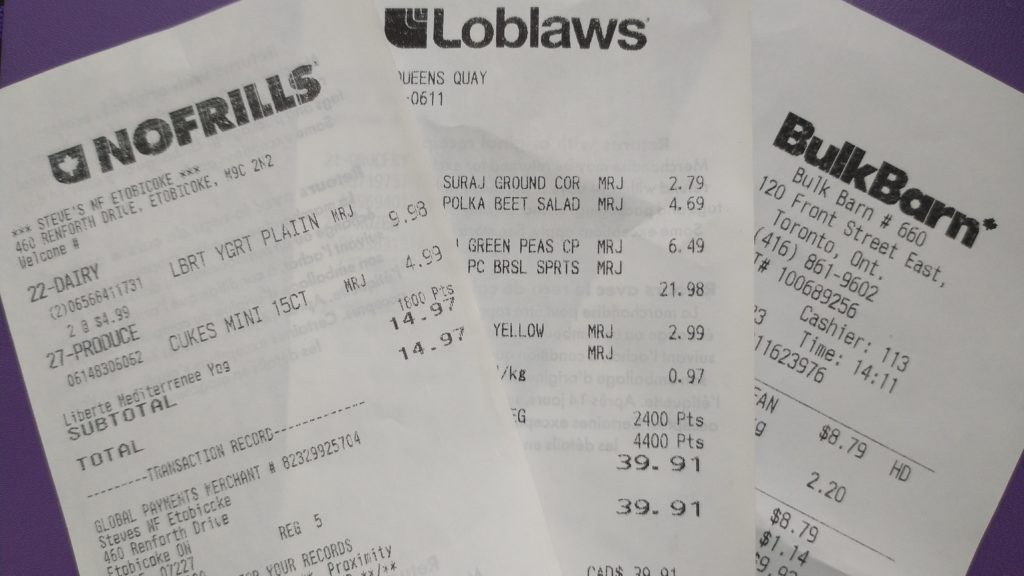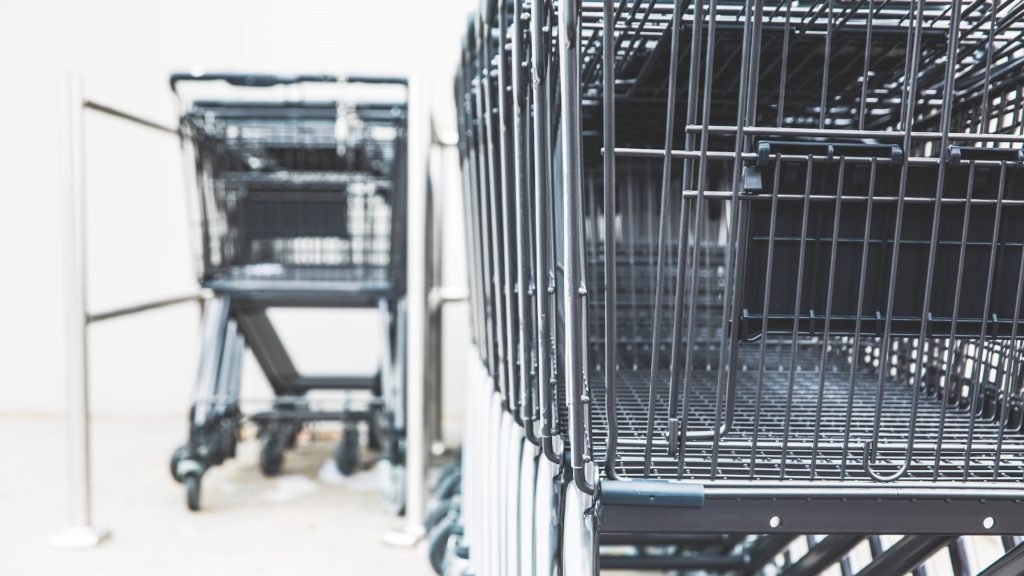When it comes to saving money on groceries, there is one rule that trumps all the tips and tricks, and it’s the simplest thing in the world:
LEARN TO PAY ATTENTION
Have you ever been out somewhere with a friend or family member and they suddenly want to pick up something they haven’t planned on buying because it’s a better price than the place that they normally shop?
I notice it most when I’m out with someone in their car and they see the price of gas in a different part of town or a different city or a different state. I always have to shrug my shoulders when people discuss the price of gas. I don’t drive, so I never have a clue. But every driver seems to possess a heightened awareness of the price of gas.
It can be the same with groceries.
Your friend/family member who notices the price of produce probably isn’t spending time memorizing numbers like a high school student the night before a history test. It’s just that they’re paying attention – and so should you.
It really doesn’t take any special skills. Anyone can do it.
And when you pay attention, you save money in two ways:
1. In the short term, you will have a better ability to discern among the sometimes overwhelming number of choices in the store.
2. In the longer term, you will unconsciously build up a repository of knowledge which will allow you to recognize a good deal when you see it.
Here are some tips on how you can build your awareness:
1. Shop alone
This tip may sound tedious, but believe me, it makes a huge difference. It’s hard to focus on more than one thing at a time. Either you’re going to be chatting to the person you’re with (or corralling your kids) or you’re going to be paying attention to your shopping.
Odds are, you are going to be paying more attention to your conversation than to your shopping, which means that you are not going to be absorbing the more detailed information related to your purchases. And you will probably pay more for them. (And you might just end up with suboptimal produce as well).
And whatever you might say in your job interviews, you are not a good multi-tasker. No one is. Multi-tasking is a myth.
2. Avoid unnecessary distractions
The reasons for this are the same as #1 but include things like listening to podcasts, talking on the phone, texting, checking your email, and whatever else it is that people do on their phones when they should be living their lives. I’m sure there are people who stream videos while shopping, but I can’t say I’ve actually ever seen that.
3. Start with the items you buy most often and the most expensive ones
I imagine there are people out there who are able to keep a broad range of pricing information in their heads. They’re just naturals.
I’m not like that at all. Numbers are not my strong suit. Even when it comes to history, which I love, I could never keep all those dates straight.
But you’ll probably find that there are a few numbers that will stick in your head – maybe not exactly to the cent but enough to know when you’re being presented with a good deal – or a bad one! These are the more expensive items on your list and also the items you buy most often (and there may be some overlap).
You’ll notice the common items just by virtue of constant repetition, and the more expensive items stick in your head because they hurt the most and they’re the ones you tend to ponder before you buy.
And you’re in luck! These are the two categories where you will probably save the most.
For items that you buy most often, even if the saving is relatively small per purchase, it’s one that adds up over time. And for the more expensive items, you’re probably only going to be swayed if the sale price is a significant percentage lower than normal.
In other words, you might buy the milk that’s $1 cheaper and so save $50 over the year, but $1 off prime rib isn’t going to get your very far. However, if you are into prime rib, then you’re going to notice when it’s being offered for a good price (which is not necessarily when the sign tells you so), and you’ll be able to take advantage.

4. Use your powers of perception to branch out
When you make a habit of look around more, you might start to notice that there is a whole range of produce you’ve never bothered to try before. Are you so convinced that Honeycrisp apples really are the best? Why not try those apples that are half the price?
For me personally, it involved the discovery of Brussels sprouts and rutabagas when I was in England (where they call them swedes) and learning how to cook collard greens when I was in Kansas. By the way, the Internet – and YouTube in particular – is a treasure trove of recipes and cooking lore.
You will probably also become more attuned to the annual cycle of produce pricing. Knowing when various fruits and vegetables come into season will help you prepare your shopping list better because you will plan menus appropriate to the season.
Have you ever noticed that nobody serves cranberry sauce at a summer barbecue or strawberry shortcake at Christmas? There’s a reason for that.
5. Make a habit of checking your receipt
I’m not sure when cashiers stopped handing out receipts as a matter of course. Probably around the same time they stopped telling us the total bill before shoving a card reader at us.
And I get it. Most people don’t want receipts, so the people serving us in cafes and restaurants and stores have got used to not giving them to us. (I think this can contribute to overspending, but that is a subject for another post!)
How does checking your grocery receipt help you develop your awareness? And awareness of what?
There are three major reasons to look at a grocery receipt – but maybe you can think of others.
1. You can double check that you have been charged the right price for an item.
Sometimes sale items don’t ring up properly (often because the sale signage has been left up too long) or you have been charged for a different variety of produce (funny how it’s always the premium variety).
When I am being checked out by a real person (rather than using the self-checkout), I find it very hard to keep track of what they are doing at the same time that I am unloading my groceries. Plus, they sometimes have the screen facing towards themselves rather than the customer. And I often feel rushed to pay the amount I’m asked for and make room for the next person.
It’s good to take a moment before leaving the store to check that you haven’t overpaid (or underpaid – for the conscientious among us).
2. Checking your receipt will give you a sense of how much produce you’re really buying.
How often do you weigh your produce? Do you really fill your bag with sweet potatoes or apples or tomatillos and walk all the way over to the other end of the produce section to the lone scale, which is never at zero and is always read to tip your produce out onto the floor from a great height? And after making a rough estimate of the weight, do you really remember the price and calculate how much you are going to pay?
No, I don’t do it either. I mean, sometimes I do. I’ll do it if I’m making a recipe that requires a certain amount. After all, I don’t want to get home and find out I haven’t bought enough. Or I’ll do it if it’s something expensive like cherries or asparagus just so I’m not shocked when the total comes through.
But I’m particularly bad at judging things like space or distance – or the weight of a bunch of bananas.
The receipt helps confirm for me how much I’ve actually purchased. It also helps me develop a sense of how much things weigh. (Actually, I’m still pretty bad at that, but maybe you’ll do better.)
3. You will become more aware of what items you are paying taxes on, and this in turn might influence the way you shop, if you are looking to avoid spending unnecessarily (and who isn’t?).
This bit of information is more useful in Canada and the US where taxes are added at checkout rather than included in the shelf price. In other parts of the world, where taxes are included in the price, you might still want to be aware of how the government profits from your buying and eating habits, but that awareness probably won’t help much in terms of your grocery bill.

6. Shadow someone who is good at grocery shopping
It might be your mom or your grandma. It might be your next-door neighbour. But you probably do know someone who is good at grocery shopping (or at least better than you).
See if you can go on a shopping trip with them. It might be as simple as accompanying your mom to the store when you are visiting. Or you might be bold and declare your intention to learn from them.
I’ll admit I’ve never deliberately gone to the grocery store to learn from a shopping master. But I have learned many tips from shopping with different people.
What you discover is that people have different ways of shopping, different priorities, and different sources of knowledge. And most people are happy to share their expertise if you ask them. Who doesn’t like to feel smart and useful?
I do realize that this tip seems to negate tip #1. The main thing is to stay focused.
But beware of noticing TOO much
There is one warning to all this, however.
Do you know why grocery stores (actually, most stores) play music? Or why they periodically rearrange their layout?
It’s because they want you to hang out in the store longer and look around more. And the more you hang out, the more likely you are to add items to your cart that you never intended to buy. (Actually, according to studies, the effect of music is not so straightforward and might have more effect on different days of the week or might encourage customers to buy certain products.)
So notice the things around you, but notice yourself as well. Be aware of what you are buying and why you are buying it. And don’t get caught in the trap they set for you. Be smarter than them.
Don’t delay, start today
I strongly encourage you to go out there and start honing your powers of perception. It is the #1 rule for saving money on groceries and encompasses every tip you’ll ever find, from coupon clipping to buying seasonal produce. Perhaps you’ll even discover patterns that you can share with others – I hope you’ll share them with me!
